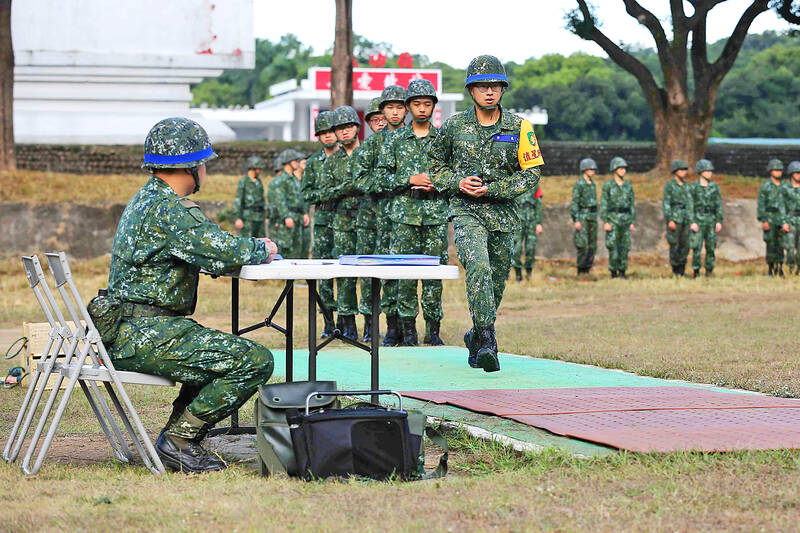Hand-grenade training, including the throwing of live grenades, is to be incorporated into the basic training of all volunteers and conscripts starting next year, as the military restarts the year-long draft, the Army Command Headquarters said yesterday.
Grenade training would be mandatory for volunteers and draftees enlisting next year, but not reservists undergoing the four-month refresher training, army Chief of Staff Lieutenant General Chen Chien-yi (陳建義) told a regular news conference at the Ministry of National Defense in Taipei.
The enhanced eight-week basic training program is being prepared for its launch next year at the Chenggongling military training camp, he said, adding that the revised program would focus on incrementally increasing the difficulty level of the drills.

Photo: CNA
The hand-grenade course is to include instructions on the steps for throwing the munition, principles of operation and safety standards before a live throw is conducted, Chen said.
Chen was asked about reports that the military plans to procure NT$1.03 billion (US$32.2 million) of M67 grenades from the US and NT$372 million of Mk 2 grenades from the Chungshan Institute of Science and Technology.
He said that while the military is striving to build up its ammunition stockpile, including procuring grenades from the US, it has no interest in buying Mk 2 grenades, which is a 100-year-old design.
The institute’s contract was to make 240,000 replacement fuses for Mk 2 grenades currently in inventory, which are to be used for training purposes, Chen said, adding that new fuses are needed to ensure the safety of trainees.
Asked about the price of NT$1,550 per fuse, he said the cost is justified, as replacing the fuses would allow the military to use a vast stock of old grenades instead of destroying them.
The military’s management of traditional munitions held in reserve must take into account a myriad of possible conditions that might occur in a conflict, Chen added.
Separately, the ministry refused to confirm a report that a US joint training and logistic group is being established in Taiwan, but acknowledged that the Pentagon has plans to reposition part of its ammunition and equipment reserves from Southeast Asia to Taiwan.
The specific type of munitions and equipment to be stored in Taiwan is yet to be determined as negotiations are ongoing, the ministry said.
The Chinese-language United Daily News on Monday reported that the army’s budget for the next fiscal year includes an NT$376 million allocation for a “US Joint Training Team Logistics Support Group” and expenses associated with that organization.
The funds made provisions for ammunition and equipment storage management, maintenance and repair, sustainment and technical support for advanced weapon systems, and overhead costs, the newspaper said.
The joint training and logistics center is to be set up to train Taiwanese troops in using US weapons and equipment, and provide technical support and logistics in an integrated operation, the report said.
The center would be made up of 200 US personnel, it said.

A Ministry of Foreign Affairs official yesterday said that a delegation that visited China for an APEC meeting did not receive any kind of treatment that downgraded Taiwan’s sovereignty. Department of International Organizations Director-General Jonathan Sun (孫儉元) said that he and a group of ministry officials visited Shenzhen, China, to attend the APEC Informal Senior Officials’ Meeting last month. The trip went “smoothly and safely” for all Taiwanese delegates, as the Chinese side arranged the trip in accordance with long-standing practices, Sun said at the ministry’s weekly briefing. The Taiwanese group did not encounter any political suppression, he said. Sun made the remarks when

The Taiwanese passport ranked 33rd in a global listing of passports by convenience this month, rising three places from last month’s ranking, but matching its position in January last year. The Henley Passport Index, an international ranking of passports by the number of designations its holder can travel to without a visa, showed that the Taiwan passport enables holders to travel to 139 countries and territories without a visa. Singapore’s passport was ranked the most powerful with visa-free access to 192 destinations out of 227, according to the index published on Tuesday by UK-based migration investment consultancy firm Henley and Partners. Japan’s and

BROAD AGREEMENT: The two are nearing a trade deal to reduce Taiwan’s tariff to 15% and a commitment for TSMC to build five more fabs, a ‘New York Times’ report said Taiwan and the US have reached a broad consensus on a trade deal, the Executive Yuan’s Office of Trade Negotiations said yesterday, after a report said that Washington is set to reduce Taiwan’s tariff rate to 15 percent. The New York Times on Monday reported that the two nations are nearing a trade deal to reduce Taiwan’s tariff rate to 15 percent and commit Taiwan Semiconductor Manufacturing Co (TSMC, 台積電) to building at least five more facilities in the US. “The agreement, which has been under negotiation for months, is being legally scrubbed and could be announced this month,” the paper said,

Japan and the Philippines yesterday signed a defense pact that would allow the tax-free provision of ammunition, fuel, food and other necessities when their forces stage joint training to boost deterrence against China’s growing aggression in the region and to bolster their preparation for natural disasters. Japan has faced increasing political, trade and security tensions with China, which was angered by Japanese Prime Minister Sanae Takaichi’s remark that a Chinese attack on Taiwan would be a survival-threatening situation for Japan, triggering a military response. Japan and the Philippines have also had separate territorial conflicts with Beijing in the East and South China